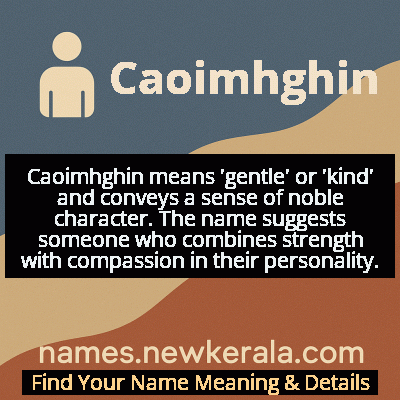Caoimhghin Name Meaning & Details
Origin, Popularity, Numerology Analysis & Name Meaning of Caoimhghin
Discover the origin, meaning, and cultural significance of the name CAOIMHGHIN. Delve into its historical roots and explore the lasting impact it has had on communities and traditions.
Name
Caoimhghin
Gender
Male
Origin
Celtic
Lucky Number
6
Meaning of the Name - Caoimhghin
Caoimhghin means 'gentle' or 'kind' and conveys a sense of noble character. The name suggests someone who combines strength with compassion in their personality.
Caoimhghin - Complete Numerology Analysis
Your Numerology Number
Based on Pythagorean Numerology System
Ruling Planet
Venus
Positive Nature
Harmonious, responsible, caring, and artistic.
Negative Traits
Overly idealistic, superficial, possessive, or jealous.
Lucky Colours
Pink, turquoise.
Lucky Days
Friday.
Lucky Stones
Diamond, turquoise.
Harmony Numbers
2, 3, 9.
Best Suited Professions
Artists, musicians, teachers, healthcare workers.
What People Like About You
Warmth, nurturing nature, artistic flair.
Famous People Named Caoimhghin
Saint Caoimhghin
Christian saint
Founded Glendalough monastery and established one of Ireland's most important early Christian centers
Caoimhghín Ó Caoláin
Politician
Pioneering Sinn Féin politician who broke significant political barriers in modern Irish politics
Caoimhghín Ó Raghallaigh
Musician
Innovative traditional musician who has significantly influenced contemporary Irish music
Name Variations & International Equivalents
Click on blue names to explore their detailed meanings. Gray names with will be available soon.
Cultural & Historical Significance
The name embodies the Celtic ideal of gentle nobility - combining strength with compassion, leadership with humility. In Irish tradition, the name suggests someone who is both wise and kind, strong yet gentle. This balance reflects the Celtic spiritual worldview that valued harmony between different qualities rather than extremes. The preservation of the name in its traditional Irish form represents ongoing cultural resilience and linguistic pride, serving as a living connection to Ireland's ancient heritage while maintaining relevance in contemporary society through its enduring values.
Extended Personality Analysis
Individuals named Caoimhghin are typically characterized by a unique blend of gentle strength and intellectual depth. They possess a natural authority that comes not from aggression but from inner confidence and wisdom. These individuals often exhibit remarkable patience and thoughtfulness, approaching situations with careful consideration rather than impulsivity. Their gentle nature makes them excellent listeners and trusted confidants, while their inherent strength allows them to provide steadfast support during challenging times. They tend to be creative problem-solvers who can see multiple perspectives and find harmonious solutions to complex situations.
In social contexts, Caoimhghins often become natural leaders who inspire loyalty through empathy rather than command. They have a deep sense of responsibility toward others and frequently take on mentoring roles, guiding people with compassion and understanding. Their analytical minds combined with emotional intelligence make them effective in fields requiring both technical expertise and interpersonal skills. While they may appear reserved initially, they form deep, meaningful connections with those they trust. The name suggests someone who values tradition and stability but also possesses the adaptability to navigate changing circumstances with grace and wisdom.
Modern Usage & Popularity
In contemporary usage, Caoimhghin remains primarily within Irish-speaking communities and families with strong cultural connections to Ireland. While the traditional spelling presents practical challenges in English-speaking environments, it continues to be valued as an authentic representation of Irish heritage. The name has experienced a modest resurgence as part of the broader revival of traditional Irish names, particularly among families committed to preserving the Irish language. It's most commonly found in Gaeltacht areas and among diaspora communities maintaining strong Irish cultural ties. The anglicized form 'Kevin' dominates international usage, but Caoimhghin maintains its status as a marker of cultural pride and linguistic authenticity. Modern bearers often appreciate the name's deep historical roots and the values it represents, choosing it as a conscious statement of cultural identity and connection to Ireland's spiritual and intellectual heritage.
Symbolic & Spiritual Meanings
Symbolically, Caoimhghin represents the harmonious integration of seemingly opposing qualities - strength and gentleness, wisdom and humility, tradition and adaptability. The name evokes the image of the ancient Irish monastery as both a fortress of faith and a sanctuary of learning, symbolizing protection, knowledge, and spiritual growth. It carries connotations of gentle leadership that inspires through example rather than command, representing the power of influence through character rather than coercion. The name also symbolizes cultural continuity and linguistic preservation, serving as a living bridge between Ireland's ancient heritage and contemporary identity. In a broader metaphorical sense, it represents the idea that true strength lies in compassion and that the most enduring leadership comes from service to others. The name embodies the Celtic spiritual ideal of achieving greatness through humility and making an impact through quiet dedication rather than loud proclamation.

